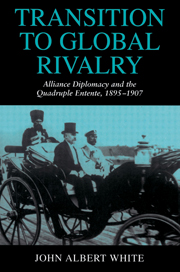Book contents
- Frontmatter
- Contents
- List of illustrations
- List of maps
- Preface
- Chronology
- List of abbreviations
- 1 Portents of conflict
- 2 The focus of hostility
- 3 The emergence of encirclement
- 4 Russia in political recession
- 5 The Algeciras factor
- 6 After Portsmouth and Algeciras
- 7 Imperial truce
- Appendices
- Bibliography
- Index
3 - The emergence of encirclement
Published online by Cambridge University Press: 04 August 2010
- Frontmatter
- Contents
- List of illustrations
- List of maps
- Preface
- Chronology
- List of abbreviations
- 1 Portents of conflict
- 2 The focus of hostility
- 3 The emergence of encirclement
- 4 Russia in political recession
- 5 The Algeciras factor
- 6 After Portsmouth and Algeciras
- 7 Imperial truce
- Appendices
- Bibliography
- Index
Summary
Russia at bay
Russo-Japanese hostilities began formally on February 10, 1904 when Japan declared war on Russia. Japan had decided, after long and careful consideration, to challenge the further progress of Russia's absorption of northeastern Asia. The Russians had not heeded the warnings of some of their own better informed and more perceptive observers that Japan was preparing to resist, forcibly if necessary, and, in all likelihood, effectively the Russian advance. Instead, the Russian government had continued to assume that Japan would not contest their steady but progressive absorption of the continental areas which Japan held vital to her security and future well being. They were accordingly divided in their counsels and unprepared for either the determination and vehemence of the Japanese attack or for the compromises that might have avoided war.
The military weakness of Russia, disclosed early in the struggle, soon led to a search for peace. The Japanese government had prepared for the possibility of having to escape from a difficult turn of events in the war by sending as spokesmen Baron Kaneko Kentaro to the United States and Baron Suematsu Kencho to Britain.
Russia, however, had not been able to take such a precaution and there were, accordingly, no established or suggested channels through which peace could be considered in behalf of Russia. Russian relationships with Germany lacked such an identity of interests. There were ties between the two imperial families and relationships between the two governments and the two economic systems. But the countries were essentially competitive and were both concerned about the security of their frontiers.
- Type
- Chapter
- Information
- Transition to Global RivalryAlliance Diplomacy and the Quadruple Entente, 1895–1907, pp. 81 - 119Publisher: Cambridge University PressPrint publication year: 1995



